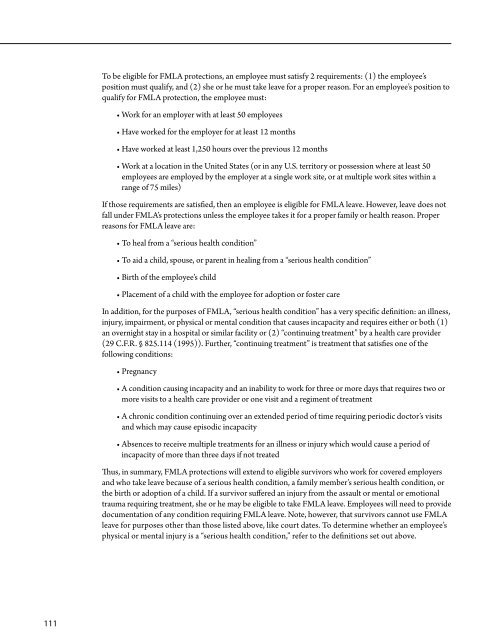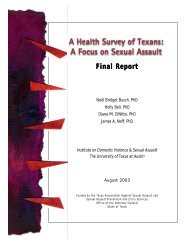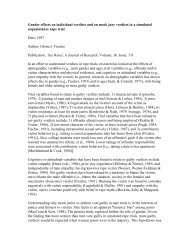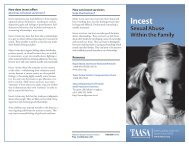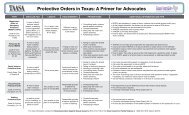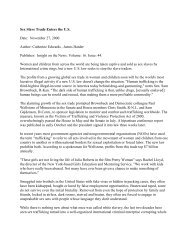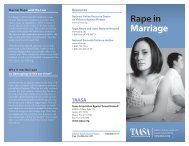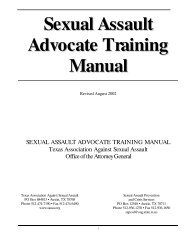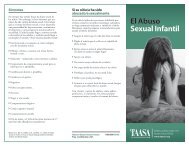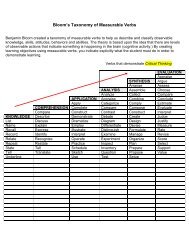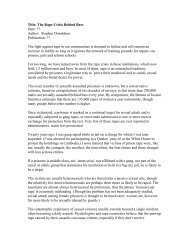Sexual aSSault LEGAL ADVOCACY MANUAL - Texas Association ...
Sexual aSSault LEGAL ADVOCACY MANUAL - Texas Association ...
Sexual aSSault LEGAL ADVOCACY MANUAL - Texas Association ...
Create successful ePaper yourself
Turn your PDF publications into a flip-book with our unique Google optimized e-Paper software.
To be eligible for FMLA protections, an employee must satisfy 2 requirements: (1) the employee’s<br />
position must qualify, and (2) she or he must take leave for a proper reason. For an employee’s position to<br />
qualify for FMLA protection, the employee must:<br />
• Work for an employer with at least 50 employees<br />
• Have worked for the employer for at least 12 months<br />
• Have worked at least 1,250 hours over the previous 12 months<br />
• Work at a location in the United States (or in any U.S. territory or possession where at least 50<br />
employees are employed by the employer at a single work site, or at multiple work sites within a<br />
range of 75 miles)<br />
If those requirements are satisfied, then an employee is eligible for FMLA leave. However, leave does not<br />
fall under FMLA’s protections unless the employee takes it for a proper family or health reason. Proper<br />
reasons for FMLA leave are:<br />
• To heal from a “serious health condition”<br />
• To aid a child, spouse, or parent in healing from a “serious health condition”<br />
• Birth of the employee’s child<br />
• Placement of a child with the employee for adoption or foster care<br />
In addition, for the purposes of FMLA, “serious health condition” has a very specific definition: an illness,<br />
injury, impairment, or physical or mental condition that causes incapacity and requires either or both (1)<br />
an overnight stay in a hospital or similar facility or (2) “continuing treatment” by a health care provider<br />
(29 C.F.R. § 825.114 (1995)). Further, “continuing treatment” is treatment that satisfies one of the<br />
following conditions:<br />
• Pregnancy<br />
• A condition causing incapacity and an inability to work for three or more days that requires two or<br />
more visits to a health care provider or one visit and a regiment of treatment<br />
• A chronic condition continuing over an extended period of time requiring periodic doctor’s visits<br />
and which may cause episodic incapacity<br />
• Absences to receive multiple treatments for an illness or injury which would cause a period of<br />
incapacity of more than three days if not treated<br />
Thus, in summary, FMLA protections will extend to eligible survivors who work for covered employers<br />
and who take leave because of a serious health condition, a family member’s serious health condition, or<br />
the birth or adoption of a child. If a survivor suffered an injury from the assault or mental or emotional<br />
trauma requiring treatment, she or he may be eligible to take FMLA leave. Employees will need to provide<br />
documentation of any condition requiring FMLA leave. Note, however, that survivors cannot use FMLA<br />
leave for purposes other than those listed above, like court dates. To determine whether an employee’s<br />
physical or mental injury is a “serious health condition,” refer to the definitions set out above.<br />
111


